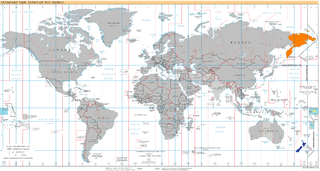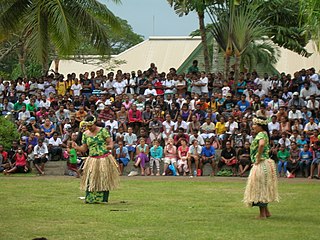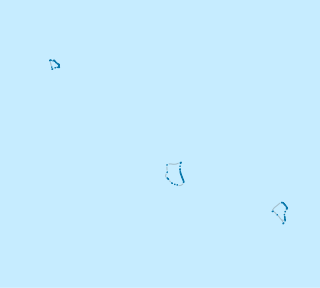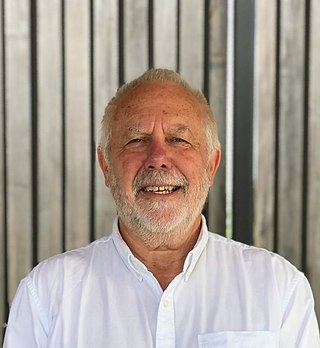
Scouting in Tokelau comes under the administration of Scouting New Zealand, continuing the arrangement from before the Tokelau became a self-governing dependency of New Zealand.

Scouting in Tokelau comes under the administration of Scouting New Zealand, continuing the arrangement from before the Tokelau became a self-governing dependency of New Zealand.

Tokelau is a dependent territory of New Zealand in the southern Pacific Ocean. It consists of three tropical coral atolls: Atafu, Nukunonu, and Fakaofo. They have a combined land area of 10 km2 (4 sq mi). In addition to these three, Swains Island, which forms part of the same archipelago, is the subject of an ongoing territorial dispute; it is currently administered by the United States as part of American Samoa. Tokelau lies north of the Samoan Islands, east of Tuvalu, south of the Phoenix Islands, southwest of the more distant Line Islands, and northwest of the Cook Islands.
Time in New Zealand is divided by law into two standard time zones. The main islands use New Zealand Standard Time (NZST), 12 hours in advance of Coordinated Universal Time (UTC) / military M (Mike), while the outlying Chatham Islands use Chatham Standard Time (CHAST), 12 hours 45 minutes in advance of UTC / military M^ (Mike-Three).
Tokelauan is a Polynesian language spoken in Tokelau and historically by the small population of Swains Island in American Samoa. It is closely related to Tuvaluan and is related to Samoan and other Polynesian languages. Tokelauan has a co-official status with English in Tokelau. There are approximately 4,260 speakers of Tokelauan, of whom 2,100 live in New Zealand, 1,400 in Tokelau, and 17 in Swains Island. "Tokelau" means "north-northeast".

The politics of Tokelau takes place within a framework of a parliamentary representative democratic dependency. The head of state of Tokelau is King Charles III in right of his Realm of New Zealand, who is represented by an Administrator. The monarch is hereditary, the Administrator is appointed by the New Zealand Minister of Foreign Affairs and Trade.

The Realm of New Zealand is the area over which the monarch of New Zealand is head of state. The realm is not a federation but is a collection of states and territories united under its monarch. New Zealand is an independent and sovereign state that has one territorial claim in Antarctica, one dependent territory (Tokelau), and two associated states. The Realm of New Zealand encompasses the three autonomous jurisdictions of New Zealand, the Cook Islands, and Niue.
The Tokelau national rugby league team represents Tokelau in rugby league football and first participated in international competition in 1986.

UTC+13:00 is an identifier for a time offset from UTC of +13:00. Because it does not contain any land in the Northern Hemisphere, this time zone is exclusive to the Southern Hemisphere.

Scouts Aotearoa, known internationally as Scouts Aotearoa New Zealand is a trading name of The Scout Association of New Zealand, the national Scouting association in New Zealand and an affiliate of the World Organization of the Scout Movement (WOSM) since 1953. Scouts Aotearoa had 12,156 youth members and with 5,888 volunteers as of the end of 2020.

A self-determination referendum was held in Tokelau between 11 and 15 February 2006, supervised by the United Nations, The proposal would have changed Tokelau's status from an unincorporated New Zealand territory to a self-governing state in free association with New Zealand, akin to the Cook Islands and Niue. However, although 60% of voters voted in favour, a two-thirds majority was required for the proposal to succeed.

The administrator of Tokelau is an official of the New Zealand Government, responsible for supervising the government of the dependent territory of Tokelau.
Rugby league is played in Tokelau and by Tokelaun ex-pats in New Zealand. A domestic competition has been established and a representative team has begun to play internationals against other Pacific teams.

Kuresa Nasau is a Tokelauan politician who has served as head of government five times and as faipule of Atafu.

A referendum on self-determination was held in Tokelau on 20 October and on 22–24 October 2007, with the result being that self-governance was rejected. Had it been successful, the referendum would have changed Tokelau's status from an unincorporated New Zealand territory to a self-governing state in free association with New Zealand, akin to the Cook Islands and Niue. However, the referendum required a two-thirds positive vote to pass, and the "yes" side fell short of the required total by 16 votes.

The national badge of Tokelau depicts a tuluma, which is a traditional Tokelauan carved wooden “tackle box” used by local fishermen. A white cross in the centre of the tuluma and the inscription below Tokelau mo te Atua reflect the strong influence of Christianity in Tokelau.

The Council for the Ongoing Government of Tokelau is the executive body in Tokelau. It serves as the governing organization for Tokelau when the General Fono is not in session. The council has six members, consisting of the faipule (leader) and pulenuku of each of the three atolls, Fakaofo, Nukunonu, and Atafu. It was established in November 2003, replacing the Council of Faipule, which had been established in 1993 and had three members – the three faipule.

Tokelau has two official languages: Tokelauan and English. Over 90% of the population speaks Tokelauan, and just under 60% speak English. Also, 45.8% of the population speak Samoan, and small percentages of the population speak Tuvaluan and Kiribati.

Siopili Perez is a Tokelauan politician. He served as the Head of Government of Tokelau from 23 February 2015 to 8 March 2016, from 6 March 2017 to 5 March 2018 and from 19 May 2022 until 6 March 2023.

Tokelauan people are a Polynesian ethnic group native to Tokelau, a Polynesian archipelago in the Pacific Ocean, who share the Tokelauan Polynesian culture, history and language.

The COVID-19 pandemic in Tokelau is part of the ongoing worldwide pandemic of coronavirus disease 2019 caused by severe acute respiratory syndrome coronavirus 2. Tokelau reported its first confirmed case on 21 December 2022. COVID-19 reached all three of Tokelau's main atolls in July 2023, when the government confirmed the community spread of the virus on Fakaofo, the last atoll without infections.

Don Higgins is a New Zealand public servant and diplomat who was appointed Administrator of Tokelau in June 2022. Higgins previously served as High Commissioner of New Zealand to the Solomon Islands, and from 2014 to 2016 as High Commissioner to Kiribati.